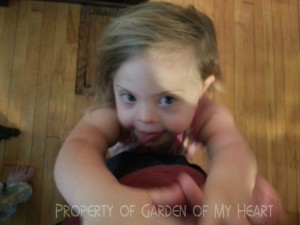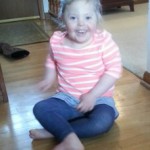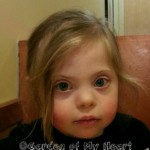First things first: earlier this month, Rowenna received an official autism diagnosis. We knew it was probably going to happen, but having a folder full of information thrust into our hands and then a month of calling therapy providers and chatting with various insurance reps made it a bit more concrete.
This has been a month of soul searching and doubting and wondering. When she was born, we didn’t have much of a lens through which to view all that was new in our life. Hubby had a bit of a head start having grown up with his brother, but parenting is a whole different game. So over the years we’ve developed our own ideas about disability informed by people with disabilities, their families, scholars on the subject, and what our gut tells us is true about our daughter.
Enter autism.
This is a whole different ballgame. I can’t help but be taken aback by some of the attitudes and offerings we’ve encountered in the last month. Where Down Syndrome World is big on support, and perfect the way we are, and more alike than different, autism world is…different. Autism world is full of treatments and fixing and people skipping vaccinations lest their children turn out like yours. Those with autism themselves (and many prefer to be called autistic, so I’ll likely use this phrase to honor that) speak of severely disliking, hating, or even feeling abused by treatment. Parents seem to fall on a bit of a spectrum – some lean far in favor of lots of therapy, early and often, and others seem to take a slightly more loosey-goosey approach. But still, the literature that’s out there, the expert advice, the general feel of it all – it’s all about fixing.
Truth time: if Rowenna had been born “typical,” and this autism diagnosis was our introduction to the world of disability, I can see how the idea of a treatment and fixing her would be so very tempting. And if Rowenna was displaying more challenging behaviors, or hurting herself, or had more difficulty accessing the world than she does now, I could still see how the idea of a fix would tempt me.
It’s pretty amazing to me how pervasive this “fix” thing is in the literature coming at us from therapy providers. Not a lot mentioned about best supporting children and families, helping them to carve out lives of their choosing. Just a lot about managing and changing and fixing.
We feel a bit stuck between a rock and a hard place. It has become quite clear to us that Rowenna truly does need support beyond what we can provide on our own. We need some expert help in providing this support. But we also still firmly believe she does not need to be fixed, nor do we want her entire life to revolve around therapy.
We’ve been interviewing therapy providers both by phone and in person. We have found one that we think will be a good fit for Rowenna, but it took sorting through some bad apples to get there. One provider recommended we pull her out of school for the next four years to do full time, in home therapy, telling us that school was unimportant and not for kids “like her.” That provider was full of gems and I practically had to scrape my jaw off the floor after listening him play to every fear a brand new parent might come with: without their specific approach to therapy she will never talk, she will never form relationships, she will never leave the house. She will be stuck in “the world of objects” forever, never to be found. They then went on to say that they were the only ones who could help, and any other provider was a fraud out to get our money.
That’s the kind of thing I’m dealing with here, people. Ridiculous. And while that provider is a particularly egregious example, I’m sad to say that many have a similar feel, if not so incredibly aggressive about the whole thing.
And the thing is, some of what we hear is so true. Rowenna is locked in the world of objects. She rarely seeks out others, she flaps her hands, she plays repetitively. It’s just that some providers and I have a fundamental disagreement: I don’t believe that Rowenna needs to stop flapping if she needs it to let off a little steam, I don’t believe that she should be forced to make and maintain eye contact all day every day, I don’t believe she needs to be trained to follow directions no matter what they are and who gives them. And hello, I am the queen of the repetitive hobby: I knit, and I don’t deny that there is some measure of just…reassurance in the repetitive motion required to create a row of nice, even stitches. So when Rowenna takes a break from the world to go dump and fill sand in the sand box over and over, I guess I understand where she might be coming from, and I refuse to take that away from her. We just want to help her find ways to do other things, too, and to come out into the world a bit.
But I’m approaching this after a few years of disability being normal. I’ve met autistic adults, I’ve met adults with Down syndrome. I don’t fear the future the way I used to. I’ve met people with all different situations and scenarios and the overwhelming take away there is that a self-determined life is the thing, not whether or not they work, live in their own place, go to college, get married. I’m not going to therapy the heck out of my daughter so I can bend her to a mold that doesn’t really quite fit anyone, diagnosis or no.
It frustrates me that there’s been so little outreach post-diagnosis about the overall health of the child and family unit. So little focus on living a life. It all just feels so predatory to me – there is something wrong, it must be fixed. Lots of therapy as early as possible so your child can lead a normal life. (And when I say lots, we aren’t talking EI amounts here, we’re talking 35-40 hours a week, and contracts that request no vacations.) These recommendations have all been made to us either solely on our word that Rowenna has autism, or after 20-30 minutes of observation and stock questions, no nuances based on her actual set of needs. Not much has felt like it’s about Rowenna, and almost everything has felt like it’s all about AUTISM.
I’m also keenly aware that I speak only from our vantage point when it comes to this. I fully recognize that autism affects each individual differently and that each individual needs a unique approach. I cannot speak for other families, nor judge those that choose a different path than we have.
So we’ve come up with a plan for Rowenna’s year: she will attend 4K five mornings a week and have afternoons of in-home therapy with a provider who sees the value in a 4 year old being a 4 year old now and then. Our therapy goals are mostly about helping her navigate a world that is increasingly confusing and overwhelming for her. We’ll do some work on rule following, socializing, and communicating, too.
I’m a bit nervous about it all and hoping that we’ve made the right choice. All we can do is jump in and have faith in our research and in our gut feeling that a little fun now and then, as well as an education, is still important for Rowenna, no matter what diagnosis comes her way.








One Response to The Plan